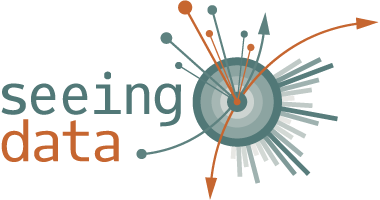Re-entering academia: excitement and culture shock
About this time last year on a Wednesday morning a tweet caught my eye: 3 funded PhDs in ‘relating to data through visualisation’! Exciting! Please come learn with us. I knew it was connected to the Seeing Data conference that I’d enjoyed the previous Autumn. And I’m always keen to support anything datavis-related close to home, Sheffield. And I liked the idea more research would be done about how people engage with visualisations. Yes, I’d be sure to look out for that I thought. So I bookmarked it and went back to work designing datavis. A month later it came up in conversation with a design friend who promptly challenged me to apply for it, something that hadn’t really crossed my mind. But the more I thought about it the more it all made sense. I did apply and the excitement I felt in doing so reassured me it was the right decision. I had been designing datavis and infographics for the last ten years and training others to do the same for the last five, and while I loved my work I had also been on the look out for something new. And here it was, the opportunity to look at the same subject but from the other side of the desk, investigating what the experience is really like for people on the receiving end of graphics. So now I find myself doing what’s called a 1+3, a one year masters to learn social research methods which leads straight into three years of PhD that will focus on developing visualisation literacy.
One term in and I can report the overriding feeling is one of culture shock! In taking the decision to do this not only was I re-entering academia after 20 years in the other/non-academic/real/business/vocational world (descriptions and experiences vary, delete as applicable), but last time I was here I was a natural scientist. Now I’m a social scientist, or at least in the process of becoming one.
The culture shock I was expecting was the transition from the ‘other’ world into academia. In practice I think it is best summed up by the humbling experience of not being able to understand most of my set readings for week one. The use of language here is different, and it tripped me up. It’s not only the quantity of words and the structures academics write within but also the subject-specific meaning of words which often differs from their more familiar, everyday meanings. However I’m pleased to say that by standing on a solid stack of introductory texts and lectures I’m just beginning to be able to see over the brick wall that I hit in that first week. All the same I have made a note to myself as, when and if I have something interesting to say: write in everyday english. I am so grateful to scholars who make the effort do this. And by making it clear what it is they are saying I have more faith that they understand what they’re talking about.
Then there’s the culture shock I naively hadn’t anticipated. The last time I was in education I was a natural scientist and as I have rapidly learnt natural scientists stand at the other end of quite a few important spectrums to social scientists once you start looking at -ologies, -isms, theories, concepts, paradigms, worldviews, frameworks, assumptions, standpoints, approaches and schools of thought. Shifting the focus of the science to humans adds a certain element of the ‘fuzzy’ and ‘slippery’ as well as a ‘messiness’ in the words of people who have been doing this longer than me, Richard Jenkins (Foundations of sociology 2002), Nigel Gilbert (Researching social life 2008) and Alan Bryman (Social research methods 2016) respectively. But I am reassured that by and large my instincts are good: it turns out having been a human all my life is quite a good preparation for studying humans. Though the fact we don’t we study sociology and philosophy at school as a matter of course seems a shame.
For all my frustrations of trying to learn the ropes of the academic and sociological worlds I am enjoying the journey. But it’s when I remember to come up for breath that I fully appreciate why it’s worth the effort: it’s not every day you’re handed the opportunity to spend a significant amount of time looking at something you find really interesting, in my case how and when and why people engage with visualisations. And that’s certainly still a really exciting prospect. Moving into 2017 I get to start fleshing out my project, something which feels like that blissful first stage of a design job (back in my other world) with a blank sheet of paper and permission to explore… except this time I have to use pre-defined paper, pens, shapes and colours! But if I’m honest that’s reassuring, taking a lead from some smart people such that if nothing else I should at least set off in an interesting direction.
